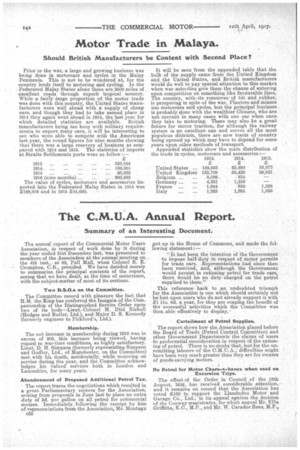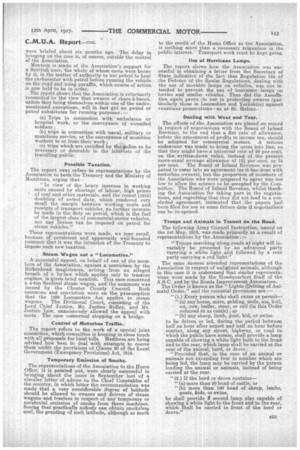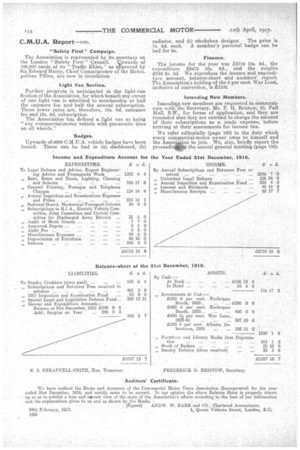The C.Ni.U.A. Annual Report.
Page 14

Page 15

Page 16

If you've noticed an error in this article please click here to report it so we can fix it.
Summary of an Interesting Document.
The annual report of the Commercial Motor Users Association, in respect of work done by it during the year ended 31st December last, was presented to members of the Association at the annual meeting on,.,. the 4th inst. at 83, Pall Mall, when Colonel R. E. Crompton, dB., presided. We have decided merely to summarize the principal contents of the report, seeing that we have dealt, at the time of occurrence,
with the subject-matter of most of its sections.
Two D.S.O.s.on the Committee.
• The Committee record with pleasure the fact that H.M. the King has conferred the Insignia of the Companionship of the Distinguished Service Order upon two of its body—Lieut.-Colonel H. Iltid Nicholl (Hedges and Butler,. Ltd.), and.Major D. S. Kennedy (formerly engineer to Pickford's, Ltd.).
Membership.
The net increase in membership during 1916 was in excess of 200, this increase being viewed, having regard to war-time conditions, as highly satisfactory. Lieut. D. H. Simpson (formerly representing Simpson and Godley, Ltd., of Manchester, on the Committee) met with his death, accidentally, while motoring on service during the year, and the Committee acknowledges his valued services both in London and Lancashire, for many years.
Abandonment of Proposed Additional Petrol Tax.
The report traces the negotiations which resulted in a great Parliamentary success for the Association, arising
g from proposals n June last to place an extra duty of 3d. per gallon on all petrol for commercial motors. Immediately following the receipt by him of representations from the Association, Mr. Montagu 050 got up in the House of Commons, and made the following statement :— " It had been the intention of the Government to impose half-duty in respect of motor permits for trade cars. Representations had since then been received, and, although the Government would persist in rationing petrol for trade cars, there, would be no duty charged on the petrol supplied to them."
This reference' back to an undoubted triumph for the Association is one which should certainly not be lost upon users who do not already support it with' 21 11s. 6d. a year, for they are reaping the benefit of the successful 'activities which the Comniittee was then. able effectively to display..
• Curtailment of Petrol Supplies.
' The report shows how the Association placed before the .Board of Trade (Petrol Control Committee) and other Government' Departments the claims 'of users to preferential consideration in respect of the rationing of petrol. There 'isno doubt that, but for the unremitting labours of the C.M.U.A.,difficultiea might have been very much greater than they are for owners of goods-carrying motors.
No Petrol for Motor Chars-a-bancs when used on . Excursion Trips. • , The effect of the Order in Council of the 18th August, 1916, has received considerable attention,, and it remains oil record that the 'Association has voted £100--. to support the Llandudno Motor and Garage Co:, Ltd.; in its appeal. against the decision of the Conway magistrates, for which appeal Mr. Ellis -Griffiths, .K. C., M.P., and 34.. W. Caradoc Rees, .M.P..„
were briefed about six months ago. The delay in bringing on the case is, of course, outside the control of the Association.
Mention is made of the Association's support for a Scottish user, the whole of whose costs were borne by it, in the matter of authority to Use petrol to heat • the carburetter with petrol before running the vehicle ' on the road and using paraffin, which course of action is now held to be in order.
The report shows that the Association is reluctantly reconciled to the view that owners of chars-a-bancS, unless they bring themselves within one of the undermentioned exceptions, will in fact get no petrol or petrol substitutes for running purposes: — (a) Trips in connection with ambulance or hospital work, or the conveyance of wounded soldiers ; (b) trips in connection with naval, military or munitions service, or the conveyance of munition workers to or from their work ; (c) trips which are certified by the police to be necessary or desirable in the interests of the travelling public.
Possible Taxation.
The report next refers to representations by the Association to both the Treasury and the Ministry of Munitions, urging that
" In view of the heavy increase in working costs caused by shortage of labour, high prices
• of coal and other materials, and the recent (1915) doubling of petrol duty, which rendered very small the margin between working costs and receipts of transport vehicles, no further increase be made in the duty on petrol, which is the fuel of the la,rgest class of commercial-motor vehicles, nor any licence tax be imposed on petrol for steam vehicles."
These representations were made, we may recall, because of persistent and apparently well-founded rumours that it was the intention of the Treasury to impose such new taxation.
Steam Wagon not a "Locomotive."
A successful appeal, on behalf of one of the members of the Association, against a, conviction by the Birkenhead magistrates, arising from an alleged breach of a by-law which applies only to traction engines, is given brief mention. This case concerned a 4-ton Sentinel steam wagon, and the summons was issued by the Chester County Council. Both summons and conviction were on the presumption that the 1898 Locomotive Act applies to steam wagons. The Divisional Court, consisting of the Lord Chief Justice, Mr. Justice Ridley, and Mr. Justice Low, unanimously allowed the appeal with costs. The case concerned stopping on a bridge.
Control of Motorbus Traffic.
The report refers to the work of a special joint committee, which committee is keeping in close touch with all proposals for local tolls. Mernbeas are being advised how best to deal with attempts to coerce them under the provisions of Clause 20 of the Local Government (Emergency Provisions) Act, 1916.
Temporary Emission of Smoke.
The representations of the Association to the Home Office, it is pointed out, were clearly successful in bringing about the issue in September last of a circular letter of advice to the Chief Constables of the country, in which letter the recommendation was made that a very considerable degree of lutitude should be allowed to owners and. drivers of steam wagons and, tractors in respect of any temporary or accidental emission of smoke from these machines. Seeing that practically nobody can obtain smokeless coal, the granting of such latitude, although as much to the credit of the Home Office as the Association, is nothing more than a necessary relaxation in the public interest. Transport work must be kept going.
Use of Hurricane Lamps.
The report shows how the Association was successful in obtaining a letter from the Secretary of State indicative of the fact that Regulation 12a of the Defence of the Realm Regulations, dealing with the use of movable lamps on vehicles, was not intended to prevent the use of hurricane lamps on lorries and similar vehicles. Thus did the AssoC.taton again prove its use in protecting owners (particularly those in Lancashire and Yorkshire) against vexatious prosecutions—as at St. Helens.
Dealing with Wear and Tear.
The efforts of the Association are placed on record in respect of negotiations with the Board of Inland Revenue, to the end that a flat rate of allowance, before the assessment of profits to income tax, should be adopted for commercial motors. A serious endeavour was made to bring the users into line, so that they might have a universal rate of 20 per cent. on the, written-down value, instead of the present more-usual average allowance of 12i per cent. or 15 per cent. The Board of Inland Revenue was prepared to enter into an agreement (as it has done with motorbus owners), but the proportion of members of the Association who were prepared to agree was too low to allow the scheme to be accepted by the Committee. The Board of Inland Revenue, whilst thanking the Association for taking part in the negotiations, and regretting:that they did not lead to a concluded agreement, intimated that the papers had been filed for use at some future date if negotiations can be re-opened.
Troops and Animals in Transit on the Road.
The following Army Council Instruction, issued on the 1st May, 1916, wan made primarily as a result of representations by the Association:— " Troops marching along roads at night will invariably be preceded by an advanced party carrying a white light and followed by a rear party carrying a red light."
The same success attended representations of the Association in respect of unlighted animals, although in this case it is understood that similar representa-. tons were made by the Headquarters Staff of the A.S.C. and by the Roads Improvement Association. The Order is known as the Lights (Drivin.g of Animals) Order," and the essential provisions are :— "(1.) Every person who shall cause or permit" (a) any horse mare, gelding, mule, ass, ball, ox, cow, heifer. steer, or calf (in this Order referred te as Cattle); or
"(b) any sheep, lamb, goat, kid, or swine to be driven or led, during the period between half an hour after sunset and half an hour before sunrise, along any street, highway, or road to 'which the public have accesst shall provide a lamp capable of showing a white light both to the front and to the rear, which lamp shall be carried at the rear of the animal, herd, or drove :
"Provided that, in the case of an animal or animals not exceeding four in number which are being led, the lamp may be carried by the person leading the animal or animals, instead of being carried at the rear.
"(2.) If the herd or drove contains " (a) more than 20 head of cattle, or " (b) more than 100 head of sheep, lambs, goats, kids, or swine, he shall provide second lamp also capable of showing a white light to the front and to the rear, which Ahall be carried in front of the herd or drove." "Safety First" Campaign.
The Association is represented by its secretary on the London "Safety Fir-1' gemiciI. Upwards of 100,000 Cards of its " Traffic Miles," as approved by Sir Edward Henry, Chief Conunivioner of the Metropolitan Nonce, are now in circulation.
Light Van Section.
Further progress is anticipated in the light-van Section of the Association., for whichbranch any owner of one light van is admitted to membership at half the entrance fee and• half the annual subscription. These lower rates are, therefore, 10s. ed. entrance fe6 and 15s. 9d. subscription.
The Association has defined a light van as being "any commercial-motor vehicle with pneumatic tires on all wheels."
Badges.
Upwards of..4000 0.M.U.A. vehicle badges have been issued. These can be had in (a) dashboard, • (b) radiator, and (e) sfnokebox designs. The price is 7s. ed. each. A member's personal badge can be had for 3s.
Finance.
The income for the year was £2719 18s. 9d., the expenditure £2473 16s. 6d.,and the surplus 2240 2s, 2d. We reproduce the income and expenditure account, balance-sheet and auditors' report. The Assoeiations holding of the 5 per cent. War Loan, inclusive of conversion, is 21100.
Intending New Members.
Initendhjg.new members are requested.to communicF.pte with-. the Secretary, Mr. F. G. Bristow, 83, Fall Mall, S.W. for forms of application, and they are reininded tliat they are entitled to charge the amount of their subscriptions as a trade expense, before arriving at their assessments for income tax.
We refer editorially (page 129) to the duty which every commercial-motor owner owes to himself and the Assoc 'on to join. We, also, briefly report the
proceedi t the annual general meeting (page 139).






















